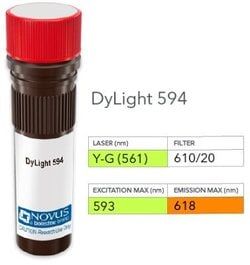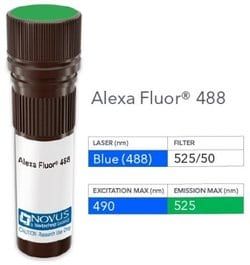CD20 Antibody (IGEL/1497R), DyLight 488, Novus Biologicals™
Manufacturer: Novus Biologicals
Select a Size
| Pack Size | SKU | Availability | Price |
|---|---|---|---|
| Each of 1 | NB007597-Each-of-1 | In Stock | ₹ 58,562.00 |
NB007597 - Each of 1
In Stock
Quantity
1
Base Price: ₹ 58,562.00
GST (18%): ₹ 10,541.16
Total Price: ₹ 69,103.16
Antigen
CD20
Classification
Monoclonal
Conjugate
DyLight 488
Formulation
50mM Sodium Borate with 0.05% Sodium Azide
Gene Symbols
MS4A1
Immunogen
Recombinant human full-length CD20 protein (Uniprot: P11836)
Quantity
0.1 mL
Research Discipline
Adaptive Immunity, B Cell Development and Differentiation Markers, Cancer, Cancer Stem Cells, Cell Biology, Cytokine Research, Immunology, Signal Transduction, Stem Cell Markers, Tumor Biomarkers
Test Specificity
Recognizes a protein of 30-33kDa, which is identified as CD20. It is a non-Ig differentiation antigen of B-cells and its expression is restricted to normal and neoplastic B-cells, being absent from all other leukocytes and tissues. CD20 is expressed by pre B-cells and persists during all stages of B-cell maturation but is lost upon terminal differentiation into plasma cells. This monoclonal antibody can be used for immunophenotyping of leukemia and malignant cells, B lymphocyte detection in peripheral blood and B cell localization in tissues. It reacts with the majority of B-cells present in peripheral blood and lymphoid tissues and their derived lymphomas. In lymphoid tissue, germinal center blasts and B-immunoblasts are particularly reactive. It is a reliable antibody for ascribing a B-cell phenotype in known lymphoid tissues. Rarely, CD20-positive T-cell lymphomas have been reported. Reactivity has also been noted with Reed-Sternberg cells in cases of Hodgkins disease, particularly
Content And Storage
Store at 4°C in the dark.
Applications
Flow Cytometry, Immunohistochemistry, Immunohistochemistry (Paraffin), Immunofluorescence
Clone
IGEL/1497R
Dilution
Flow Cytometry, Immunohistochemistry, Immunohistochemistry-Paraffin, Immunofluorescence
Gene Alias
B1, B-lymphocyte antigen CD20, B-lymphocyte cell-surface antigen B1, B-lymphocyte surface antigen B1, Bp35MGC3969, CD20 antigen, CD20 receptor, CD20S7, CVID5, LEU-16, Leukocyte surface antigen Leu-16, Membrane-spanning 4-domains subfamily A member 1, membrane-spanning 4-domains, subfamily A, member 1, MS4A2
Host Species
Rabbit
Purification Method
Protein A purified
Regulatory Status
RUO
Primary or Secondary
Primary
Target Species
Human
Isotype
IgG
Related Products
Description
- CD20 Monoclonal specifically detects CD20 in Human samples
- It is validated for Flow Cytometry, Immunohistochemistry, Immunohistochemistry-Paraffin.


